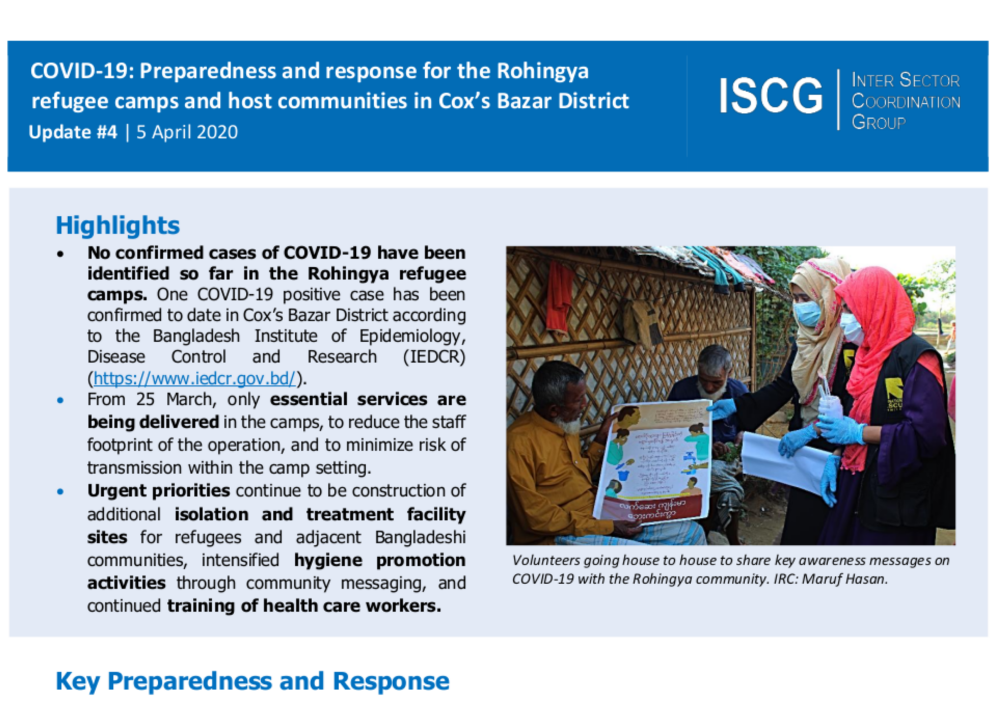Covid-19: United Nations coordination group voices concerns about government preparations in Rohingya camps
Limited testing, lack of oxygen supplies, no intensive care capacity and mobile phone restrictions amongst concerns set out in UN report.

As the Bangladesh government orders Cox’s Bazar district to go into lockdown, a report published by the United Nations coordination body that manages activities in the Rohingya camps highlights major gaps in the government’s response to the Covid-19 infection in these camps and the surrounding area.
In the report, titled “Covid-19 Cox’s Bazar Update #4” and dated April 5th, the Inter Sector Coordination Group (ICSG) points out that there is “extremely limited testing” of the population for Covid-19 infections; an “absence” of intensive care capacity; and, inadequate supply of oxygen required to treat seriously ill patients. It also sets out its concern about the reduction in mobile phone and internet facilities in the camps.
Three days after the report was posted on ICSG’s website, the government ordered Cox’s Bazar district to be put on lockdown preventing people from entering or exiting the district.
In a section titled “Key Challenges”, the report notes that “the major current gaps remain the extremely limited testing, and intensive care capacity in the district.”
Regarding the testing capacity for the Rohingya population, the report welcomed the government’s decision to decentralise testing capacity to Cox’s Bazar but noted that the “IEDCR field laboratory at Cox’s Bazar Medical College (CBMC) started operating on April 2 however still has limited capacity.”
The report moves onto medical care, “The absence of intensive care capacity is a major concern, as this will inhibit the ability to provide needed care quickly for serious or complicated cases. In particular both short and long term oxygen supply is a critical issue, requiring urgent resolution.”
In relation to oxygen supplies, the report notes, “While options have been identified in Chittagong, this will not be sufficient to supply the needs fast enough in Cox’s Bazar. Currently there is no available solution for long term supply nationally.”
Netra News contacted officials of the Directorate General of Health Service by phone and text but have had no response. We have also sought comment from Nicole Epting, the Senior Coordinator for the Rohingya Refugee Response and the Inter Sector Coordination Group (ISCG).
The ICSG report also criticises the mobile phone and internet restrictions in the camps which have been in place since September 2019, “Communications are key to the timely and effective management of this situation.”
It notes that the humanitarian community continued to “advocate for enabling 3G and 4G in the camps” and says that while there were “reports of temporary activation of the 3G network in some camps on Wednesday 1 April, the lack of internet access in the camp continues. With Covid-19 and the cyclone and monsoon season approaching, communication will be essential for actions to be taken to save lives in support of and collaboration with the authorities.”
The concern for the lack of availability of mobile and internet services in the camps follows recent criticism from Human Rights Watch that the “Bangladesh government’s internet blackout and phone restrictions at Rohingya refugee camps are obstructing humanitarian groups from addressing the Covid-19 threat.”
Asaduzzaman Khan Kamal, the Bangladeshi minister of home affairs, told Netra News that an instruction was given to downgrade 3G to 2G service in the Rohingya camp, “I don’t know about any blackout.” The minister also said that many Rohingyas inside the camps are engaged in different kinds of unsocial activities, “They have lots of internal feuds amongst themselves. They are also involved with Yaba trading. That’s why we ordered the downgrading of 3G service into 2G service.”
There are no confirmed cases of Covid-19 identified so far in the Rohingya camps, though one positive case has been confirmed in Cox’s Bazar district.
According to the ICSG report, “Urgent priorities continue to be construction of additional isolation and treatment facility sites for refugees and adjacent Bangladeshi communities, intensified hygiene promotion activities through community messaging and continuing training of health care workers.” Planning is underway to prepare an initial 1,700 beds across the district, the document notes.●